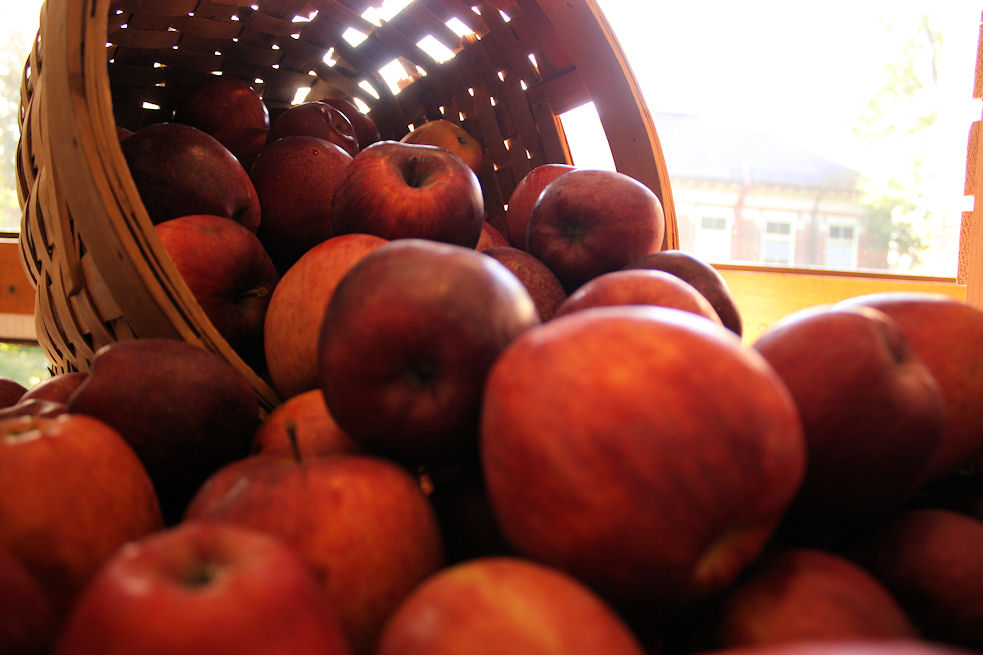Wednesday marks the start of Rosh Hashanah, a Jewish celebration signifying the new year. You may be familiar with the numerous traditions surrounding the holiday, including eating apples dipped in honey, or better yet, tasting a new fruit. These are traditions that appear to be fundamental to modern Jewish identity but are quite removed from ancestral ceremonial practices. And yet, this is somehow perfectly true to our history. At its core, Rosh Hashanah is a holiday of “new,” and following a tradition of change is not as contradictory as it seems.
Apples and honey is a dish that — while consisting of two characteristically Jewish ingredients — doesn’t have any explicit biblical affiliation. The ancestor to the modern apple was cultivated as early as 3,000 years ago in the mountains of Kazakhstan. While apples made their way to the Middle East through various trade routes, it was only until Roman conquest that apples became a widespread crop. Bee honey, while also existing in some Middle Eastern historical contexts, became far more prevalent under Roman rule.
Historically, Jews consumed figs, raisin cake and date syrup to symbolize a sweet new year. It wasn’t until the medieval era in France and Germany that red apples dipped in honey became a common inclusion in New Year meals.
These celebratory meals involve a blessing over a new fruit, a tradition that represents all the qualities of the new year —abundance, possibility and new beginnings. Because Rosh Hashanah is a two-day holiday, the fresh fruit also warrants a second reciting of “Shehechiyanu,” the blessing said over new experiences.
Back then, the concept of a “new” fruit implied a fruit that had recently come into season or was not available to harvest in the previous year. Apples were an obvious choice, though grapes, pomegranates, berries and figs also fit the bill. As globalization brought the world closer together, more exotic fruits became the highlight of Rosh Hashanah ceremonies. Nowadays, grocery stores carry fruits from all over the world at convenient prices year-round. Kosher markets across the country order a surplus of “new fruits” from Asian produce suppliers specifically for the holiday, causing a specialized boom in the international economy. Star fruit, lychee and guava likely assume the role of the new fruit at holiday meals today.
In true Jewish fashion, this raises a question. How are we fulfilling the “minhagim,” or customs, of Rosh Hashanah by dipping apples in honey or eating a dragonfruit when these customs didn’t exist all those years ago?
Well, traditions evolve with society. Jews have been around for a long time, and therefore we’ve had to maintain a shared sense of community throughout history. Traditions form to hold us together even when the world itself is unrecognizable.
It follows that this sense of community is flexible about changes in traditions and locations. The Jewish diaspora led to independent Jewish communities reforming under unique circumstances and developing their own growing traditions. In Morocco, sesame seeds and sugar are enjoyed at Rosh Hashanah. In Iraq, apples are stewed in spices. In Georgia, pomegranate chicken is a staple of holiday cuisine. In the case of the Jews in France, apple season came right around the new year, and local bee honey brought more than enough sweetness. Thus, a delicious “minhag” was born.
Failing to recognize that change is fundamental to Jewish tradition can lead to problematic consequences. Current trends in far-right Christian nationalist agendas mischaracterize Jewish ideals under the broader scope of “Judeo-Christian” religious fundamentalism. Co-opting Jewish values to prevent societal progress directly contradicts what holidays like Rosh Hashanah represent. On all levels of Jewish observance, we are meant to challenge, to question and to adapt. It’s one of our greatest strengths.
I’ll end with some fruit for thought. This fall, take some time to appreciate the change in your life. Dip an apple in some honey, date syrup or other environmentally friendly sweetener of choice. If you’re looking for a new fruit to try this week, support a local farm stand or check out what the University’s Permaculture and the Student Farm are harvesting these days.
Shana Tova U’Metukah. Have a good and sweet new year. Oh, and happy birthday Dad.
Daniel Estrin can be reached at [email protected].



















